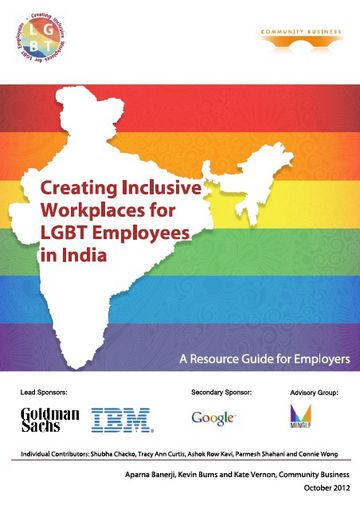Acceptance Of LGBT In The Indian Corporate World
Sneha, who has been working for almost a decade now says that when she leaves for work she leaves a big part of her back home. For the past ten years she has been trying to hide who she is and has become perfect with that. She adorns a perfect look and talks about marriage and having kids and at the same time she hides her tomboy instincts and "lesbian looks" at work. When she talks to her colleagues about homosexuality, they often mark it as a trend picked up largely from Western shores.
If by chance Sneha plans to reveal her sexual preference then it would not only lead to a fall in her career but will also become a butt of many jokes in her office. She also fears that this might be used against her, if revealed. But Sneha talks calmly to other female colleagues and cooks up stories of heterosexual escapades so that she is not out of place in office. The pressures to fit into the heterosexual norms have made her a shape shifter constantly changing, censoring and editing her nature.
India has a typical workplace attitude of “don’t ask, don’t tell” pattern when it comes to sexual preference, gender identity or sexual orientation of an employee. People opt to leave these issues outside the workplace and often term them as private affairs. However, organisations like Equal India Alliance and Mingle (Mission for Indian Gay & Lesbian Empowerment) are working towards equality for LGBT people.
Rohit Bal, a famous fashion designer is gay and has no qualms about it. He started his own fashion line in 1990 and has won many “Designer of the Year” awards. His top clients are Cindy Crawford, Uma Thurman, Naomi Campbell, Pamela Anderson and Anna Kournikova. He is as open about his relationship as his exquisite peacock and lotus motifs. Also, he has openly accepted that his heart belongs to none other than the handsome Lalit Tehlan, though they have called it quits now.
In 2006, Prince Manvendra Singh Gohil, made a public announcement that he was gay. This made him the first Prince to accept his homosexuality openly. At that time his community ripped his family, the King his father was enraged with him and refused to accept his homosexuality. Meanwhile, the Queen his mother publicly disowned her son and the Prince risked his own freedom as homosexual acts in India led to an imprisonment of 10 years. Prince Manvendra, who came on The Oprah Winfrey Show, said that “I couldn’t talk to anyone, couldn’t share my views with anyone. So, I was confused as to whether I’m the only one like that and I wondered if there are other people like me or was this some kind of disease?”
For decades the lesbian, gay, bisexual and transgender have fought a lonely battle for their acceptance. But now many multinational companies are coming forward and encouraging the LGBT community to come out of their closet. They believe that creating LGBT-inclusive work environments is the need of a growing business. Representatives of 11 companies including IBM, Cisco, Goldman Sachs, General Electric, Dell, Novell, Royal Bank of Scotland and Microsoft came together for a day to foster the best services for their LGBT employees. This informal collaboration was the second meeting held and marks an endeavour in the Indian corporate sector to create a friendly workplace for LGBT. Most of these companies have training programmes where they sensitise employees regarding LGBT rights.
According to, “Inclusion in India Inc.” reports 98% companies don’t have any concrete steps and measures to hire people from the LGBTs - lesbian, gay, bisexual and transgender or make their workplace a friendlier place for them. The report compiled by IIM, Ahmadabad and Biz Divas (diversity and inclusion consulting firm) had surveyed around 21 companies. Out of the 21 companies, 15 were MNC’s and six Indian companies from sectors like IT consulting, telecom, real estate, pharmaceutical and engineering which employed around 260 to 56,000 people. What is amazing about these companies is that they accepted the invitation to participate in the research which was sent to almost 90 companies. Sadly, out of these 21 companies only two companies had focus on LGBT in the minority group.
Glassdoor has come up with a list of 250 plus companies which are LGBT friendly. Some of them on the list are:
Bain & Company – Manager, Australia (Bain & Company), says “If there was ever a company that invested in its people its Bain. Local and global training, formal mentorship and sponsor programs, diversity initiatives, customized learning, learning through apprenticeship - that's all Bain.”?
Orbitz Worldwide – An employee states “Diverse, very LGBT friendly, flexible work environment”
Google – A Softwear engineer says, “Very pro-women, pro-LGBT, pro-minority environment”
NIKE – A Senior Business Systems Analyst has stated that “Employee groups for African Americans, Asian Americans, Disabled, Native Americans, Latinos/Latinas, and Gay, Lesbian, Bi-Sexual, Transgender people.”
Microsoft – An employee has mentioned that the organization has encouraging diversity in terms of action committees and discussion groups for gay & lesbian along with a flexible work environment.
As per Stonewall, an organisation which works for the equality of lesbians and gay men in the UK, states that hiding sexual orientation of employees reduces productivity of work up to 30%. Similarly, Catalyst an organisation in the US states that if LGBT employees are given resource groups, employee networks, and mentoring they perform 7-16% higher in their workplace.
Parmesh Shahani, head of Godrej India Culture Lab and author of Gay Bombay: Globalization, Love and (Be) Longing in Contemporary India, states, “LGBT people are a talent to be pursued and they don’t like working with companies that discriminate.”
By Shubhra Rastogi
















